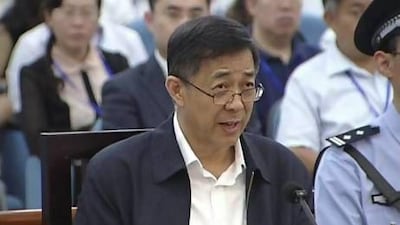JINAN, CHINA // Packing to cover the most publicised trial in China since Mao Zedong's wife and the Gang of Four were put in the dock more than three decades ago, my instinct was to travel light - a few cotton shirts, a wide-brimmed hat, sunblock and some oral rehydration salts to protect me from the sweltering midsummer heat.
After all, the conviction of Bo Xilai, who once aspired to be the leader of this country of 1.3 billion people, was a foregone conclusion and the evidence marshalled to achieve it anything but unimpeachable.
The trial would be over in a day, even a matter of hours, experts said. Bo would be hustled off to jail, probably for the rest of his life or even, to await execution. After, say, two nights in the eastern Shandong province, I would head back to Beijing. Or so I thought.
What altered the calculations of all reporters covering Bo's trial was the government's decision, announced the night before the trial began, that it would "tweet" the case "live" on China's popular micro-blogging website Weibo.
So instead of loitering outside the courthouse trying to catch exiting lawyers or interviewing "Boxilists" who turned up to support their political hero, members of the press retreated to their hotel rooms or a cafe, any place where there was air conditioning and an internet connection.
From the start of the trial on August 21 until Monday afternoon, when the court finally adjourned, that is where we camped, studying the transcripts that the court posted regularly.
Even with the government's decision to tweet the case, reporters believed it would consist of a stream of turgid, propaganda-speak. It would be next to useless, we decided. Or, so we thought. Again.
Yet at 9am a post appeared on Weibo that Bo Xilai had arrived in court, his first public appearance in 17 months, and at about 11am a picture of him appeared on the site.
Though there was little doubt the transcripts had been redacted, they were fascinating - providing an insight into the personality of a Chinese maverick whose greatest crime, according to his supporters, was his desire to lead the country.
Bo denied almost all the charges against him. He was not guilty of accepting bribes he said - it was his wife, Gu Kailai, and son, Bo Guagua, who had accepted gifts, including a villa in France and all-expenses-paid holidays from the Chinese billionaire, Xu Ming.
Likewise, it was his wife, not him, who was the recipient of 5 million yuan (Dh3m) of public funds, when they were based in the province of Liaoning in the early 2000s. But he admitted he should have kept a closer eye on her.
And, as for the charge of abuse of power, which related to him using his position as party secretary in the southwestern city of Chongqing to cover up his wife's involvement in the murder of the UK businessman Neil Heywood, he said he had "made mistakes" but that he was not guilty.
While China watchers said the case had exposed cracks at the top of China's ruling party, only a handful of Chinese appeared interested in the politics of it.
Instead it was the salacious details which caught the public's imagination, specifically the suggestion that Bo, Gu and the Chongqing police chief, Wang Lijun, were involved in a love triangle, the confession that Bo had an affair and the tale of how the Bo family had feasted for a month on the meat of a rare African animal.
Bo's attempts to portray himself as a humble public official uninterested in the finer things in life also prompted scepticism, as he claimed he had been wearing the same thermal underwear for the last 40 years - a pair that his mum had bought him in the 1960s.
"These thermal underwear should probably be put into a museum along other ancient things," one netizen using the handle Lehaha joked on her Weibo account.
Whether Bo managed to win anyone over with his defiant stance or claims of a humble life, dedicated to public service, is anyone's guess, but his demeanour stirred debate, making him as divisive in custody as he was in power.
"Bo's imperious behaviour is disrespectful to the court. He is arrogant in the face of the law," wrote one Weibo user. Another wrote: "This is a can-do man. We need more officials like him. Shame on those that destroyed him."
And in stark contrast to trials of other leaders in the last three decades, Bo was given a more prominent platform and more time to try to salvage his legacy. Indeed, it is the longest high-profile political trial since the Gang of Four were in court in 1980 for treason, sedition and counter-revolutionary activity over their actions during the China's cultural Revolution.
In the end most reporters' relationship with the court feed was one of love and hate. Sure, it kept us out of the sun and it contained real and useful information. But it is difficult not to disdain anything that makes you wade through page after page of Chinese legalese.
twitter: For breaking news from the Gulf, the Middle East and around the globe follow The National World. Follow us

